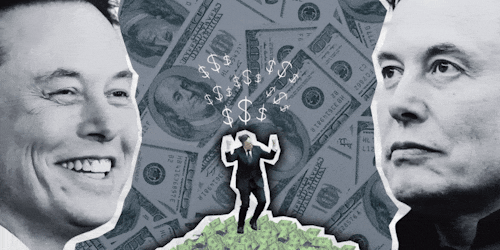|
|
|
|
Elon Musk is on track to become the world’s first trillionaire, after Tesla shareholders approved the largest-ever compensation package for a chief executive.
It’s an almost incomprehensible sum, but we’ve attempted to visualise it by comparing it to Switzerland’s GDP and calculating the gigantic slab of gold it could buy. But as Carl Rhodes writes, the real value of that money is the power it buys, both inside Musk’s companies and in the world at large.
Of course, billionaires have always used their fortunes to shape the world, whether under the umbrella of philanthropy or as unabashed political influence. As Rhodes asks, do we really want global priorities decided by a handful of unelected, unaccountable and ultimately self-serving individuals?
|

|
Matt Garrow
Editorial Web Developer
|
|
 Carl Rhodes & The Conversation Digital Storytelling Team Elon Musk is set to become the world's first trillionaire, delivering him unprecedented power and influence. |
Best reads this week
|

Michelle Grattan, University of Canberra
The dismissal is etched into the mind of all who were there at the time, but at its 50th anniversary is its legacy really appreciated?
|

Philipp Kastner, The University of Western Australia
After rebel fighters captured a major city in Darfur last week, alarming reports emerged of massacres and sexual violence targeting the region’s Black population.
|

Jane Lydon, The University of Western Australia
Tony Abbott begins his book Australia: A History, by telling off professional historians – and laments the “cultural confusion” of our present moment.
|

Elaine Gregersen, Northumbria University, Newcastle
The process of telling our truth may be cathartic at the time, but it can also re-open old wounds.
|

Julia Henning, University of Adelaide
Cats are excellent at communicating, but humans still routinely misunderstand them.
|
Podcasts
|

Gemma Ware, The Conversation
Robert Muggah, an expert in organised crime in Brazil, explains the origins of the Commando Vermehlo, the gang targeted in a deadly raid in Rio de Janeiro in late October.
|

Michelle Grattan, University of Canberra
Next week is the 50th anniversary of the dismissal of the Whitlam government. We’re joined by Niki Savva and David Solomon to talk about their memories of that day.
|
Our most-read article this week
|

Dennis Altman, La Trobe University
Even for those not interested in royal gossip, Andrew Lownie’s joint biography of former Prince Andrew and Sarah Ferguson is a fascinating – and revealing – read.
|
In case you missed this week's big stories
|
-
Leonora Risse, University of Canberra
New analysis reveals just how much “invisible” caring and housework is worth to the economy.
-
Adrian Beaumont, The University of Melbourne
The Coalition’s primary vote fell to 24%, just nine points higher than One Nation. One Nation could be on track to overtake the Coalition as the main right-wing party.
-
Bruce Wolpe, University of Sydney
The Republicans have tried to blame Democrats for the shutdown. But in US politics, the president owns the economy, for better or worse.
-
Jonathan Baker, University of Adelaide
Only 9% of plastics ever made have been recycled. Clever industry campaigns have shifted the costs of their own waste onto consumers.
-
Wesley Morgan, UNSW Sydney; Ben Newell, UNSW Sydney
Australia will go to the COP30 climate talks with better emissions targets and a desire to boost flagging action.
-
Jacqueline Peel, The University of Melbourne
As climate change worsens, some states are backsliding on climate action. Next week, negotiators will gather in Brazil to try to restore flagging energy.
-
Michelle Burgis-Kasthala, La Trobe University
Israel may be isolated now, but Arab leaders understand the need to keep the peace, maintain US support, and expand economic ties with Israel.
-
Olayinka Ajala, Leeds Beckett University
Despite the number of fatalities from terrorism in Nigeria, it is difficult to delineate the killings based on religious affiliations.
-
Charles Livingstone, Monash University
The Cup is still Australia’s biggest one-day race gambling event. But there are signs it’s no longer stopping the nation like it used to.
-
Gary Mortimer, Queensland University of Technology; Maria Lucila Osorio Andrade, Tecnológico de Monterrey; Shasha Wang, Queensland University of Technology
Protecting retail workers from abuse is a growing challenge. But a new study and a past trial suggest three little words on a badge can nudge customers to be nicer.
-
Milad Haghani, The University of Melbourne
There is a lack of regulation across Australia when it comes to e-bike use, with young riders often paying the price.
|
|
|
|
|
We'd love to hear from you. You can email us with your thoughts on our stories and each day we'll publish an edited selection.
Hot air
"Albo had such a clear mandate after the last election to move quickly on recommendations from the Samuel review (into the Environment Protection and Biodiversity Conservation Act). No implementation, just another 550 page government review to do not very much. Very, very disappointing Albo. I’ll be voting independent, Teal or Green next time. You won’t be getting another crack from me, mate."
Benjamin Schutte 
What counts as work?
"Whilst acknowledging the typical discrepancy in unpaid domestic labour between the sexes (guilty as charged!), I am regularly frustrated by articles of this nature that fail to identify just what type of work is included or excluded in this definition. Does it for example, include contributions towards domestic harmony by way of: home maintenance (painting, cleaning gutters etc), gardening (mowing lawns, pruning trees etc), vehicle maintenance, home office work (financial planning, bill paying, tax etc), social planning etc? This is not meant to be pedantic but rather to better understand the bigger picture."
Jake Howie 
Ed: Fear not, your mowing is counted. Leonora Risse’s research uses the ABS definitions.
Thank you
"I'm with Anna (Your Say, November 3) on republishing. I used The Conversation regularly as an "in" to find academic papers when studying toward an undergraduate degree, and in recognition of the 'involuntary' support you gave me, began my regular annual donation. In addition, I am loud in my enthusiasm for The Conversation, and frequently share your articles and encourage others to subscribe, for the high-quality, informative and thought-provoking articles you publish."
Ann Britton 
|
| |
|
|
|
The Conversation AU/NZ
Melbourne Victoria, Australia
•
Full Time
|

|
|
| | | |